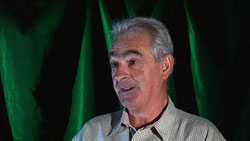1962-1963.
 |
| Sergeant Alan Caulkett |
For the rest of the time we did a lot of parades. The Queen's Birthday Parade both years 1962, 1963. Over at an island called Stonecutters, which I think I have already mentioned, were the ranges where we did all our annual classification. You couldn’t do much training because everything was so restricted. All the barracks were cut into the side of the hill. Ground was a priority. Nice barracks but in the season it got very hot and humid. Everything had to be left out because everything used to go mouldy. Boots used to go mildewy, everything used to go green, clothing used to go green with the damp. Nice in the summer. Lots of snakes around. I had the ammunition store, it was the old gun emplacement from the Second World War, and all the ammunition was under the hill, so you kicked the doors hard as you had the odd snake lying along the inside of the door. We had pythons, cobras, I got hit by one, not bitten. I was company orderly sergeant. We wore beret, shorts and socks rolled down over our boots. I was walking back from one place to another and as I did this I noticed a bamboo snake (we called them that), it was a white lipped pit viper, only a little thing and it was right on the path. I can remember seeing it and jumping, and there was a wet patch on my foot where he had had me. That was a bit of a near miss. There were quite a few snakes, you had to watch where you were going. Another amusing thing, we had CS gas and we were practicing, and they sealed up a tent on the Square and everyone had to test their respirator and everything went all right. But we had one grenade that did not go off. So, being in charge, I was given it, and they said go and get rid of it. I took it down the back end where all this scrub was. I went to see my WO2 [warrant officer class 2] and I said “how much detonator cord should I use?” and he said “give it one and a half turns round the grenade”. He said to connect it up to the wires of a 33 detonator, it should blow it apart and release the gas. So I did what he told me. One half went a hundred yards one way and the other the other way and we ended up with two companies of the men with beaters, trying to put all this scrub out which was on fire. I went back and said “You did say one and a half” and he said “maybe a bit too much”. That was quite good.
We did a lot of IS duties, internal security, drills, box drills, with banners saying disperse or we fire. Another thing was (I did not take part because I was headquarters company) was Operation Seal when the Communist Chinese opened the border above Kowloon and let all the refugees over the border. The New Territories was flooded with refugees and our battalion and other people were all mobilised, their job was just to go and round up anyone they could, anyone in the country who looked a bit suspicious, and literally round them up and sling them into the back of 3 tonners then put them in barbed wire enclosures. Then the Special Branch and other people came down and went through them and sent them back over the border again. Whether it was a ploy to get lots of people across the border I don’t know. It was a big thing and went on for some time. The other big thing was water shortage. We had to convert everything to sea water, all the toilets, because there was no water. We only had water every three days from standpipes, the prisoners had to go down to the sea to fill up the systems for all the barracks.